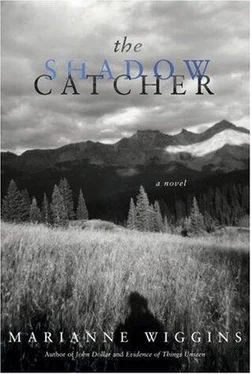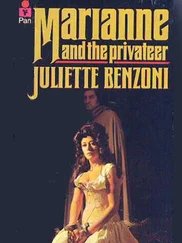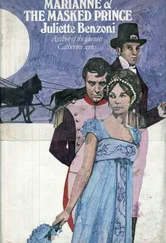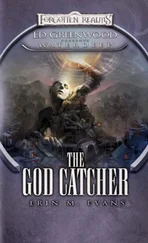In his own mind he was CURTIS, the signature — E.S.C., the monogram — and who on earth would care, in the gristmill of posterity, if the only thing it said on his gravestone were the two words, LOVING FATHER?
Lester tells Clarita there will be wheelchairs at the hospital and he offers to carry her to the truck but she insists on going in her moto because she doesn’t like to “be push,” and within minutes we’re on the road, the two of them chatting up a storm in the front cab while I hold onto the wheelchair with both hands to keep it from rolling all around the flatbed of the truck, my hair flapping in my face as we speed along under the now predictably scorching Vegas sun.
I go inside with them so I can show the I.D. that we found to the nurse at the nurse’s station on the cardiac floor and then while Clarita sits beside “Johnny’s” bed I tell Lester I’m going to check into a hotel to work the phone and Internet to try to locate Curtis Edward’s son before the weekend starts and places of information, like schools and businesses, shut down.
I give him my cell phone number and he agrees to call me later and in half an hour I’m standing in the middle of my own loft suite at the Alexis, an off-Strip hotel across the street from the Hard Rock but far enough away from the noise to guarantee some quiet. I draw a hot bath then get down to work checking the online White Pages for Elkton, Virginia, and then Mapquest to find out where the hell Elkton, Virginia, is . There are four Edwardses listed in Elkton and after I have my bath I call them all, asking in my best non-threatening I’m-a-nice-person voice if any of them are missing an old man named Curtis.
Not one.
If the son was ten years old in 1970, as the article says he was, he would have graduated high school in ’76 or ’77 so I dial Elkton Regional High and ask to speak to someone who can help me trace a graduate, owing to a “family emergency.” I get a really nice sounding lady who digs out yearbooks for those years and finds a Curtis Edwards, Jr., in the senior class of 1977.
“Would you happen to know if he went on to college after high school?”
She asks me to hang on a while and then she comes back and says they don’t keep those kinds of records but that someone in the office remembers Curtis Edwards, Jr., and would I like to speak to her. I say I would and then a second nice sounding lady comes on the line and tells me she doesn’t remember Curtis, Jr., himself, but she remembers he was well known in the town because he got written up in the local paper when he won a scholarship to the Air Force Academy “out there in Colorado.”
I call Colorado Springs and ask to speak to the press office and tell the young man on the other end my tale (“family emergency”) and after some time he’s able to confirm that Curtis Edwards, Jr., graduated the Academy in June 1981.
“Is there any chance that you can tell me his address?”
“No, ma’am.”
“The town he lives in?”
“’Fraid not.”
“Because of Homeland Security?”
“Because, I think, of the Constitution.”
“Can you say if he’s active or retired?”
“I can say that he’s on active duty, ma’am.”
“Can you tell me where?”
“No, ma’am.”
“Can you tell me his rank?”
“Ma’am, why would you want to know his rank ?”
I take a breath. Sir, I say: “I’m trying to find a man whose father has had a serious heart attack and may not make it through the weekend. This man’s last name is Edwards. Aside from having an entire Air Force Base named Edwards, how many Edwardses do you think you might have on active duty? Ten, fifteen? Twenty? If I knew this gentleman’s rank it would—”
“That would be a colonel, ma’am.”
I Google Col. Curtis Edwards, Jr., and come up with nothing.
I order lunch.
I think about how to find a colonel in a haystack, and then when my room service arrives it dawns on me to call Nellis Air Force Base right here in Vegas a couple miles away and ask to speak to a public relations liaison. Which I do, while sitting on the bed, picking at my thirty dollar salad. My call is passed from one department to another and while I wait I doodle the colonel’s last name on the hotel notepad, followed by his first name. Then I draw two lines and stare:
EDWARD /S/, CURTIS
“How can I help you, ma’am?”
I explain the story (leaving out my personal involvement) to a man who says he’s the public relations officer and then he asks if he can call me back after he relays my story to Personnel and I tell him no, I’d rather hold. After a while another person comes on the line and says, “I understand you’d like to speak to Colonel Curtis?”
“Yes, please. It’s a family emergency.”
“Please hold while I connect you—”
Are you kidding me? Is this a trick—?
“Colonel Curtis’s office.”
Um…
“—hello?”
Sounding like a prattling fool, even to myself, I give my name, my occupation, my nine-digit Social (am I paranoid ?), my cell phone number and a brief description of the reason for my call (“I have information pertaining to the current whereabouts of his father”) and am told with icy dispatch that my message will be passed on to the Colonel.
I put my cell phone down and stare at it because as everybody knows, that will make it ring.
Ten minutes go by, while I eat my salad. Fifteen.
Guy probably has a busy schedule.
Flying planes around.
Maybe, god forbid, he’s in Iraq.
I pace, and think of other things I could be doing. I didn’t handle this well. I should have left the number of the hospital. The important thing is not for me to talk to the Colonel but for the Colonel to talk to his father. But what if he doesn’t want to? What if, after thirty years, he’s made up a story in his mind about why his father disappeared, a tale that permits him to forgive or to accept the fact? Why would he want to hear a different tale — a counter-story — at this point in his life? We tell ourselves the things we want to hear, not necessarily the things that are the truth, and it’s selfish of me to want to know what story the Colonel has manufactured for himself in the name of mental health.
Or what story Clara Curtis or any woman, for that matter, married to a man with more than one sexual identity manages to tell herself on those dark nights when the unspoken truth must be too obvious.
I don’t love you .
Or perhaps I love you but I love someone else as well.
I love another way of being and this life is killing me by inches and I need to get away from here or die.
What did the Curtis children — Harold, Florence, Beth and Katherine — think about their father’s disappearances? I know the stories that they told themselves had at their core a classic mythic entity — a larger-than-life Father, the Father as a Hero. I know they created for themselves the story of a spiritual antithesis, even if it wasn’t true, of what a modern kid might do, of a false deity, a modern day Flat Daddy. For the Curtis children el jefe , the Chief, could do no wrong, even when wrong was all that he was doing. So I wonder how it was for this Air Force Colonel, and yes my self-investment drives my curiosity because I had to do a lot of magical explaining to myself in the years after my father’s suicide and I’m frankly curious about how others — we, generic humans, as a tribe —create whatever stories that we need to just so we can cope .
At four o’clock my cell phone finally rings and it’s Lester calling from the pay phone by the nurse’s station to say that things aren’t looking good.
Читать дальше











